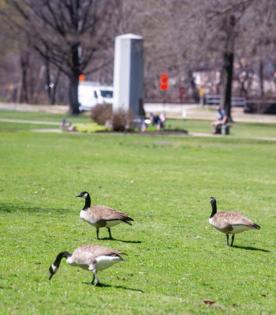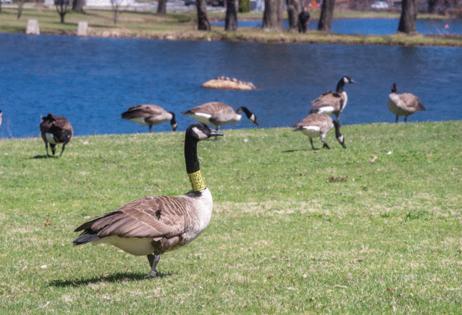Planned 'mass execution' of geese in Conn. city paused after outpouring of passionate input on both sides
Published in Science & Technology News
HARTFORD, Conn. — Tears, shouts and interruptions marked residents’ comments Wednesday night over a proposal to exterminate geese in Bristol, Conn., parks.
As the city’s Board of Parks considered a proposal to kill resident geese that are causing excessive waste that is marring Veterans Memorial Park, dozens of residents shared conflicting opinions on how the city should proceed.
One decried that “mass execution” could take place at the park dedicated to freedom and another objected that the proposed means — using nets to round up and gas to euthanize the flocks — would cause the geese to suffer for up to 45 minutes before they died.
Some speakers, though, said the excrement defiles the sanctity of the space dedicated to the city’s veterans and that it’s the city’s obligation to clean up the area and deal with the problem.
There were calls for humane alternatives, which officials explained had been tried with little effect over the years, and objections that even killing the geese would be a temporary solution since the park offered an idyllic home that would continue to attract birds. Though the birds are migratory Canada geese, Department of Energy and Environmental Protection migratory bird expert Min Huang said the geese are so comfortable in the Bristol parks that they stay year-round.
While one resident warned that children might become sick from putting the overabundant goose feces in their mouths, another offered that she and other residents could pick it up for disposal while cleaning up after their dogs.
A fourth grader whose class wrote letters to the board on the subject suggested an alternative habitat could be made instead of investing in killing the geese.
In total, Mayor Jeff Caggiano said officials had received 119 emails, 40 phone calls and other input from residents over the contentious issue. He and Huang acknowledged that Bristol and dozens of other towns across Connecticut have wrestled with the issue for decades.
“We have a situation here where you have more geese than some people are willing to tolerate,” Huang said. “By taking a drastic measure such as euthanasia, you make progress immediately.”
Maintenance to limit the population would then require other tactics such as destroying nests, hazing birds, addling eggs, not feeding the geese and making the location less appealing, he said.
The $3,365 cost to round up the geese would likely need to continue for a few years to have the desired effect, officials said.
In response to a DEEP survey, Huang said, 60% of Connecticut municipalities reported that geese were a problem but so far none has opted to round up and euthanize the geese as Bristol is considering. New Britain, which has also had problems with geese overrunning its parks, has been limiting the population there by killing small numbers of birds.
The population of geese in the state is just too high relative to what Huang called “social tolerance.”
He estimated the state has a year-round population of 27,000 birds, while the agency’s management goal is 15,000. The state does not engage in killing geese but supports municipalities in pursuing how to manage their populations. Hunting, he said, is the most helpful tactic in more rural areas. Caggiano quipped that it would not be possible in Bristol.
Ultimately, the board decided to take no action and delayed the issue until its meeting next month, May 15 at 6 p.m.
_____
©2024 Hartford Courant. Visit courant.com. Distributed by Tribune Content Agency, LLC.










Comments